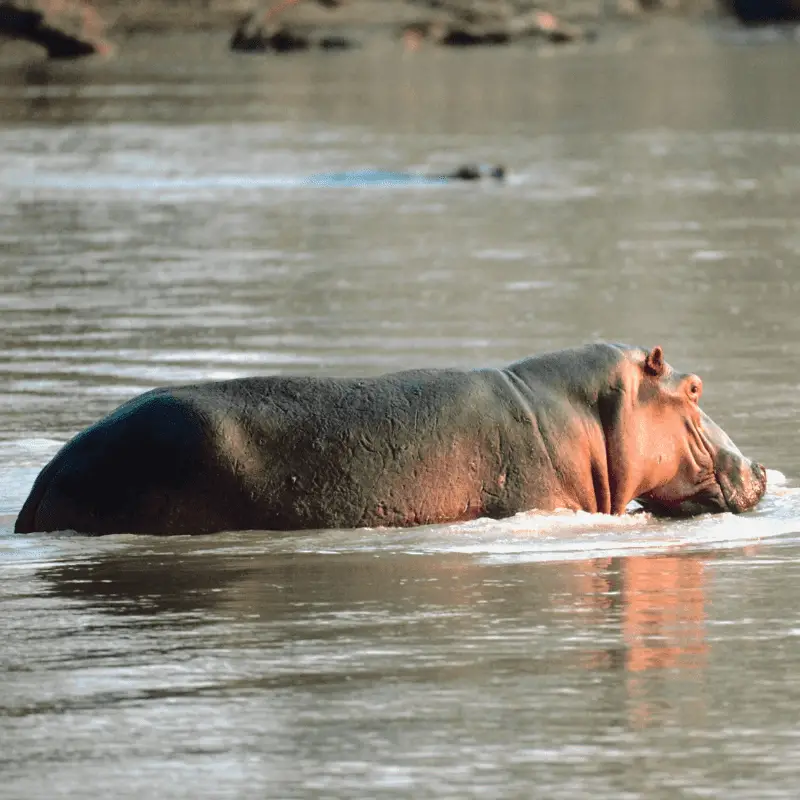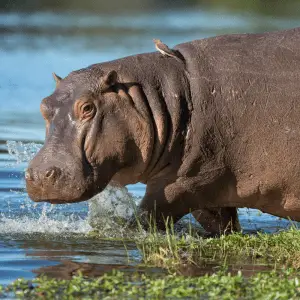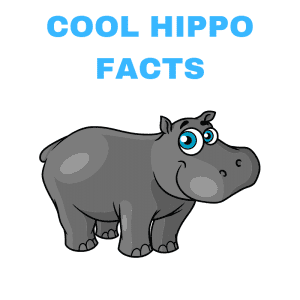No, hippos can’t swim in the water. Even though they love water and spend most of their time submerged in it, hippos cannot swim traditionally. Hippos can stay underwater for 5 minutes at a time but cannot move around underwater unless they walk on the water floor.
They love to spend most of their time in the water, called Water Horses or River Horses.
The word Hippo in Greek means horse, and the phrase potamus means river.
Let’s learn more about the hippopotamuses, why they can’t swim traditionally, and their personalised swimming technique.
Why can’t a hippopotamus swim?
Hippopotamuses cannot swim due to their hefty and large bodies. Compared to their bodies, the limbs of these animals are tiny. That is why they cannot float on the water even if they want to swim; their bodies don’t allow them to.
However, their unique skeletal structure helps these animals to use graviportality. These animals use their massive weight to drag their heavy bodies onto the river bed.
Hippo Swim Technique
Hippos move around while still staying submerged. While moving underwater, the hippos walk along the river bed by lightly touching the bottom and gliding through the river. The weight of a hippo and the water go together very well, and movement is fast.
These animals use their bone density and buoyancy to move faster during this time. Extremely robust limb muscles of these animals can also help propel them through the water bodies.
Graviportal Meaning
An animal that has physically adapted due to its high body weight.
Graviportal Animals
- Elephant
- Hippotummues
- Giant Tortoises
How fast can a hippopotamus swim underwater?
Hippos cannot swim in the water. Instead, they walk on the reservoir floor with the help of their powerful muscles and toes. The hippos can move underwater at five mph using their unique swim technique.
How long can hippos hold their breath?
Hippos do not have gills like fish for breathing underwater. They have a unique lung structure that helps them to stay underwater without breathing for about 5 minutes. That means a hippopotamus needs to come up to the surface for air every 5 minutes. In most cases, the hippos jump up from the river floor to the surface to breathe, sink back down, and move along the bottom of a river bed.
Baby Hippos Swimming Abilities
Even though hippopotami can give birth on land and in water, the mother mostly chooses to give birth underwater.
Even though baby hippos weigh less than their parents, they do not float to the water’s surface. Immediately after the baby is born, the mother hippo pushes her baby to the surface to take its first breath.
Baby hippos weigh between 55 and 100 lbs but do not know how to swim. After giving birth, the mother hippo will guide her baby so that they can learn their swimming technique.
A newborn baby Hippo can hold its breath for about 40 seconds. Once that time is over, the mother will keep pushing the baby hippo to the surface to get used to the swimming technique.
Once the babies are a couple of days old, they can hold their breath for about 90 seconds. During this period, the babies learn to move underwater from their mothers.
Hippo mothers breastfeed for the first eight months of the baby’s life. Even though baby hippos can feed underwater, they can also feed on dry land.
The baby hippos can’t swim traditionally. However, They can push themselves up from the bottom of the river and float around the water for some time.
How deep can a hippopotamus go underwater?
The hippopotamus cannot swim in a traditional style underwater. Instead, hippos walk on the lake or river floor to reach a destination. That means hippos do not like water bodies that are too deep. If the water body is shallow and clear, it is the perfect place for the hippos. Hippos can hold their breath for no more than five minutes, so the depth level to the floor needs to be within this time limit. To reach the bottom and bob up to the top for air each time.
Do hippos swim or float?
Even though hippopotami are considered semi-aquatic animals, their body structure and weight are incomparable to any other aquatic or semi-aquatic animals.
Hippos neither swim nor float. Instead, they bob up and down in the water. The bouncing water technique up and down allows them to walk underwater using their weight and push up for air using strong leg muscles.
Hippos spend most of their life staying submerged in water bodies. The hippopotamus’s body structure and massive body weight do not allow these animals to swim normally.
Even though these massive animals cannot swim, they move underwater by charging through the water bodies.
Why do hippos prefer to spend more time in the water than on land?
The hippopotamus has a unique skin type that needs to stay hydrated constantly. Hippos don’t have any sweat glands in their bodies, meaning they require an external source, such as water, to keep their body temperature within a sustainable limit.
These are the two reasons why the hippopotamus cannot survive for a long time on land. If a hippo starts living on dry land, its body will quickly dehydrate.
Blood Sweat
Hippos do not possess any sweat glands in their body. That’s why the hippos start to pour blood and sweat instead of sweating, creating a layer of mucus on their body.
If a Hippo stays on dry land for a long time, this sweat helps to keep its skin moist.
This layer of blood sweat on the hippopotamuses’ bodies helps reduce the potential of contracting infections and other diseases from dirty water bodies.
These animals only get out of the water body to hunt for food. The primary food resource of these animals is grass and water plants.
Body Structure
More often than not, people find it hard to believe that hippos spend more than 75% of their life underwater without knowing how to swim.
However, there is an explanation behind this weird habit of these animals. Even though these animals have heavyset physiques and round bodies, they have natural buoyancy, which they use to bob up and down and move around underwater.
Hippos have a natural osteosclerotic due to their unique appendicular skeleton. It means the bones of the hippopotamuses start to harden abnormally, which helps the bone density elevate significantly.
The water supports their weight; for the hippos, underwater is like living in a microgravity environment. One push, and they bounce like an astronaut. They then use their muscle power to gallop on the water’s floor.
If this unique osteosclerotic skeleton structure suddenly vanishes, the hippos could not move around as smoothly underwater as they can now.
With this unique osteosclerotic disorder and the extra weight of their bodies, the hippos generally require the support of their 3 feet while walking on the dryland. In simpler words, these massive animals do not want to walk on dry land for a long time because of their unique body structure and walking style. They prefer to be in the water.
While walking on the dry land, these animals need the support of three of their feet on the ground to step forward. It makes walking a real struggle for these heavyset animals.
Can hippos sleep underwater?
Yes, hippos can sleep underwater. Their unique breathing feature automatically allows them to bob up and down to breathe without waking.
These animals are semi-aquatic, so they can still relax and sleep while submerging. The unique physical structure of these massive animals helps them to achieve this.
It is undoubtedly an exceptional evolution lifestyle adaptation that hippos have gained over the years.
Can hippopotamuses swim in the sea?
Hippos can not swim in the sea since they cannot swim traditionally. Hippos are too heavy to swim in the sea, and as the water depth in the ocean is much deeper than in lakes and rivers, hippos cannot go beyond a certain level as they need to be able to come up for air to breathe. Hippos bob up and down for air and walk along the water bed.
Can hippos drown?
A hippo cannot drown in water even though the heavy bone structure of the hippopotamus’s body helps them stay underwater for a long time. The same body weight supports these massive animals to move up to the water’s surface for breathing.
It also allows these animals to move underwater without facing any trouble. Another notable fact is that the locomotion style of the hippopotamus also enables these animals to sleep underwater without drowning. These are why these massive semi-aquatic animals can’t drown, and the ears and nostrils auto-close when submerged.
How can hippos see underwater?
Yes, hippos can see underwater because their eyes have a protective membrane that helps them see even though submerged. This membrane protects the surface of the eye from muddy water.
When these animals sleep or move around underwater, they tend to close their nostrils and ears to save themselves from drowning. However, this transparent membrane helps these gigantic animals to keep their eyes open and observe the aquatic environment. That also helps these animals to work underwater without facing any problems.
Do hippos eat underwater?
Hippopotamuses eat on reeds and small grasses that grow in grassland around the water bodies. Even though these animals stay underwater for a significant amount of time, they cannot consume any food. These animals cannot munch on anything with their ears and nostrils closed. These animals graze on grass or other plants only on dry land.
Do hippos close their ears when underwater?
Yes, hippo ears automatically close when they go below the water’s surface. Their nostrils also close up on their own. This stops the Hippo’s water from getting into its ears or nose.
Do hippos close their nostrils when underwater?
Yes, the nostrils of a hippo automatically close when they go under the water’s surface. The nostril closes to stop water from getting into the nose and lungs.
Eating Habits
These animals mostly eat at night to protect themselves from being exposed to the sun’s harsh rays. They come out of the water bodies only after sunset and return to the water before sunrise. That is why hippos change their diet considerably during dry seasons when the vegetation around the water bodies gets scarce.
During the dryer months, hippos can also consume birds and other animals living in and around their territory, apart from feeding on vegetation.
Only in this time of scarcity do hippos try to eat aquatic plants. However, the portion of the aquatic plants they consume is much smaller than their regular diet.
That is why in most cases, hippos tend to move from the dryer location to a different area to avoid such food scarcity.
Meat and aquatic plants are not hippos’ preferred choices of food.
Can hippos breathe underwater?
No hippopotamus cannot breathe underwater. The reason is that a hippo has no gills, and they close their nostrils and ears to stop water from getting inside their bodies when they go underwater. While staying underwater, hippos can hold their breath for about 5 minutes. After that, they come up to the water’s surface to breathe fresh air.
Can hippos swim faster than humans?
Yes, hippos swim faster than humans using their swim technique. Even though these gigantic animals weigh about 1400 kg, they have powerful muscles and bone structures.
Hippos can run underwater at a speed of 8 mph. Compared to that, humans can swim at two mph speed. That means when covering shorter distances; hippos can outswim humans easily.
How long can hippos stay underwater?
Hippos can stay underwater for 16 hours to a whole day. However, these gigantic animals cannot breathe in water. Every 5 minutes, a hippo must come up to the surface to breathe fresh air.
Baby hippos can hold their breath for 40 seconds to 90 seconds. Their ability to hold their breath increases significantly as they grow old.
Hippos can sleep underwater as well. However, they do not have to wake up to breathe fresh air during this time; it automatically happens.
Can hippos live without water?
Hippopotamuses are semi-aquatic animals, so they spend much time in the water. They don’t have sweat glands and need to be near water to keep their body temperature under control. That’s why they can’t live in a place without any water.
Why are hippos so dangerous when they spend most of their time in the water?
Hippopotamuses are considered the most dangerous land animals in the world. The hippopotamuses are heavily territorial and can attack anyone or anything that enters their territory. It does not matter whether a human invades the territory or an animal. The hippos will charge at them without giving it a second thought.
Hippos can run significantly faster on dry land and swim more quickly in the water than humans. They have a bite force of 12 600 kPa, nearly roughly three times stronger than a lion at 4481 kPa. Their weight is enough to crush animals and humans, and their super sharp teeth help them tear through any obstacles. Hippos have taken down many large animals like Impala buffaloes and Kudu.
These animals are unpredictable and highly aggressive. It is especially true when hippos are with their babies. They may look cute and have a sluggish appearance. However, they are far from being gentle. These gigantic animals can charge without even a moment’s hesitation and can cause significant damage. If you see a Hippo yawning, you should move away from that situation, as yawning is a warning signal that hippos showcase when they feel threatened.






